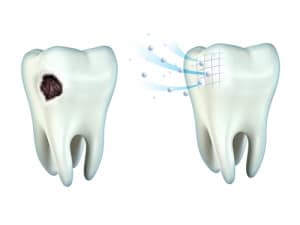 Tooth decay and cavities are two of the most common dental conditions across all ages – from children to seniors. Most people are aware that an excessive consumption of sugars can lead to cavities, but are unaware of how this actually happens. Before the cavity can form, tooth decay forms and begins eroding the tough outer layer of the tooth (the enamel). Unfortunately, sugars aren’t the only factor that increases enamel erosion. From drinks, medical conditions, and genetics, to environmental factors – there are many things that can wear at your tooth enamel.
Tooth decay and cavities are two of the most common dental conditions across all ages – from children to seniors. Most people are aware that an excessive consumption of sugars can lead to cavities, but are unaware of how this actually happens. Before the cavity can form, tooth decay forms and begins eroding the tough outer layer of the tooth (the enamel). Unfortunately, sugars aren’t the only factor that increases enamel erosion. From drinks, medical conditions, and genetics, to environmental factors – there are many things that can wear at your tooth enamel.
Foods & Drinks
We know that anything high in sugar isn’t good for your teeth – but what are some foods and drinks that fall under this category? Soft drinks are some of the biggest culprits, even “diet” sodas can damage your tooth enamel. Avoid citrus fruits and juices, candy, energy drinks, and even vinegar in excess amounts.
Dry Mouth
Medically known as xerostomia, dry mouth occurs when you have decreased saliva production. The saliva around your mouth helps to encourage other bacteria that don’t produce acids, unlike plaque. Without it, plaque continues to flourish, increasing your chances for oral infection (like tooth decay and gum disease).
Medical Conditions
If you suffer from acid reflux or other gastrointestinal problems, your stomach acid can actually result in enamel erosion.
Environmental Factors
Additional wear and tear on your teeth due to stress or friction can damage the outer layers of your teeth. For example, those who suffer from bruxism (chronic grinding or clenching of the teeth) are often creating friction (with added pressure) between their teeth. On the other hand, however, you can create additional wear if you’re too rough with your toothbrush (applying too much pressure) or by using your teeth to bite or chew something tough – like your fingernails, for example.
Enamel erosion often results in tooth sensitivity, tooth decay, and eventually, cavities. Remember to keep up with your regular dentist visits to prevent all of these!



